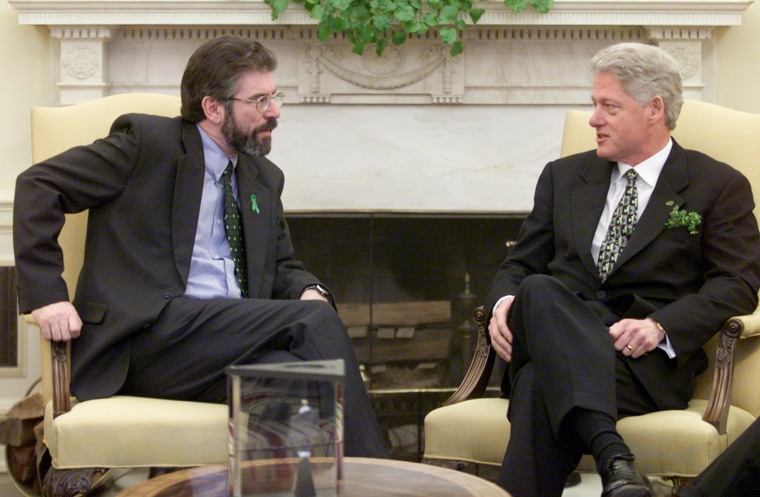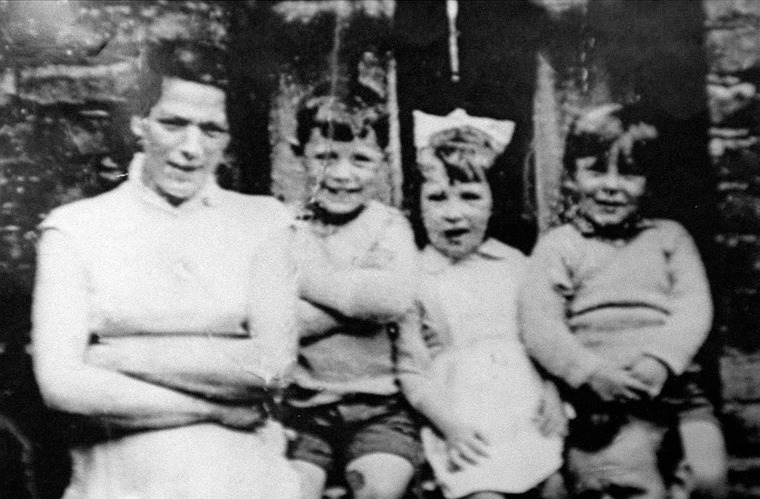His leadership in the Northern Ireland peace process earned him handshakes with U.S. presidents, but republican leader Gerry Adams awoke in a police cell Thursday following his arrest over an historic murder that came to epitomize the region’s violent past.
Adams was being questioned over the abduction and execution of Jean McConville, a widowed mother-of-10 who was killed in 1972 by the Irish Republican Army (IRA), which fought to make Northern Ireland independent from Great Britain.
The 65-year-old's dramatic arresthighlighted the remarkable transformation of its key players from outlaws to global statesmen.
Adams' detention was triggered by beyond-the-grave confessions from former IRA bombers and commanders as part of a U.S. oral history project, underscoring the deep scars left by the conflict.

“This will have a big impact,” David McKittrick, author of “Lost Lives” and “Making Sense of the Troubles,” told the BBC. “Gerry Adams is one of the most famous Irishmen in the world and instead of being in parliament in Dublin or Belfast, he is in a police cell. It is very significant.”
Adams, who is the president of the Sinn Fein political party, has always denied any role in McConville's killing.
“They barged their way in. Me and all my brothers and sisters was holding onto my mother, crying and squealing."
He questioned the timing of his detention only three weeks ahead of important elections.
“I am innocent, totally, of any part in the, the abduction, the killing or the burial of Jean McConville,” Adams told reporters at a Belfast police station where he voluntarily went to be questioned. His party deputy, Mary-Lou McDonald, described the timing as “politically contrived.”
Adams' arrest followed a legal battle over Boston College's 'Belfast Project’ tapes -- a powerful series of confessional recordings made in 2001 by former militants on the understanding that the contents would not be released until the death of all the participants.
Police in Northern Ireland sought to obtain transcripts of the interviews after one of the participants, Dolours Price, claimed publicly that she had driven McConville to the scene of her killing. The U.S. Supreme Court declined to hear an appeal by the college project’s leaders against the decision to release the transcripts.
Among the subpoenaed recordings handed over was an interview with a former IRA commander, Brendan Hughes, who also named Adams in McConville’s death.
Adams is the seventh person to be arrested over the case since the transcripts were handed over. He can be held for questioning for up to 48 hours, at which point he must be charged or released unless investigators apply to courts for an extension.
“If they want to start re-examining everyone’s position, including members of the British government, they are going to open up a lot of old wounds," said New York Congressman Peter King, who noted that Adams played an important role in the peace process.
“He was more instrumental than anyone,” he said, adding: “The political implications of this [arrest] when there is growing tension in Northern Ireland anyway ... this will only add to it.”
McKittrick, the author, questioned whether the tapes could be used as evidence. Participants in the Belfast Project “may have spoken very freely” under assurances of confidentiality, he said.
“Those assurances turned out not to be the case. I’m not sure how much of what they said would stand up in court.”
Deep sectarian divisions
Even by the standards of a conflict in which thousands of civilians were killed by Catholic and Protestant paramilitary groups, McConville’s execution stands out as pitiless.
Born a Protestant, she converted to Catholicism after marrying a Catholic man who served in the British Army –- two rarities that made her a target for suspicion amid the deep sectarian divisions of the 1970s.
The IRA, which wrongly believed she was an informant for British authorities, abducted her in front of her children and buried her on a beach in County Louth. Her body wasn’t found until 2003.
One of her sons, Michael McConville, told the BBC on Thursday that he knows who took his mother because some of the gang were not wearing masks, but added that he would never tell police out of fear of retribution.

“I was 11 years of age when the IRA gang came in and pulled our mother out of our arms,” he said. “They barged their way in. Me and all my brothers and sisters was holding onto my mother, crying and squealing.
“I knew my mother was dead about two weeks later when an IRA man had came and left my mother’s purse and her wedding rings at the house. We never spoke about it because we were taken into care and split up into different homes.”
He said he was himself beaten with sticks a week after his mother’s disappearance and told never to reveal the names of those responsible.
“I never told anyone who it was. I still haven’t told anyone who it is. I do know the names of the people. I wouldn’t tell the police. If I told the police now ... me or one of my family members or one of my children would get shot by these people.
“Everybody thinks this is all gone away -– it hasn’t gone away. There’s a lot of splinter groups from the IRA ... they would class you as an informant and they would shoot you.”
He said he had seen the perpetrators in public “on many occasions,” adding: “When I see them my blood boils in my body ... I can’t stand these people for what they done.”
“I have a young family. I don’t want nothing to happen to them. If think if my mother was alive today she wouldn’t want anything to happen to them. I hope everybody understand the situation that me and my family is in.”